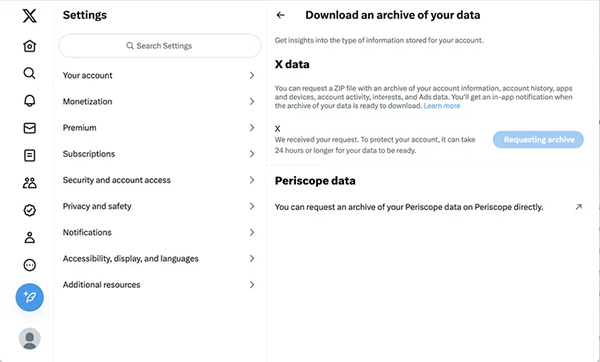While I was in school, my Twitter account was filled with bullshit and naive tweets. That significantly affected my reputation at my workplace and also among my colleagues. Even if I post something sensible about the industry or the domain I work in, I am not confident at all.
In fact, 91% of companies today include social media in their employment process. This process involves inspecting the candidate’s nature through their social media and judging whether they fit right for the company or not. It may even impact the future prospects of gaining employment.
If you are lucky enough, your workplace may still give you a chance to erase all the past tweet records that may not go with your picture. So, let me help you on guiding how to do so. Read this article till the end.
Most people have posted things online that they later regret. For teens and young adults especially, social platforms are spaces to share passing thoughts that may not have been carefully considered. Statements you made years ago likely don’t provide an accurate picture of who you are today.
Hence, here are some reasons you may want to delete Twitter tweets before beginning a job search:
In the political environment of today, public views we publish could cause conflict even years later. Most companies prefer to avoid hiring somebody who could generate poor reactions or attention. Deleting such provocative tweets from your history reduces this danger.
Moreover, the words you used years ago might look objectionable now. Even if at the time, posts were socially acceptable, out-of-date terminology and phrases could today be seen as improper or insulting. Deleting them releases this responsibility.
References to illegal drug use or underage drinking, even lighthearted jokes, often don’t sit well with recruiters and HR departments. If your Twitter history contains anything that violates such ethics codes or sends a similar message, you need to remove that ASAP.
Social platforms invite users to share thoughts in the moment, including frustration and anger. Venting about previous jobs, colleagues, companies, or clients can easily cross the line from blowing off signals to unprofessional bad-mouthing. These tweets can significantly impact how hiring managers judge you.
Let me admit it, almost everyone has posted silly, immature, or embarrassing updates on social media at some point. While this kind of behavior is part of growing up, it may not align with the professional image you now want to project.
The thing goes both ways. While your management may understand that you’ve grown up, deleting these old tweets can help you put your best foot forward with recruiters.
DID YOU KNOW?
70% of employers use social media to screen candidates during the hiring process, and 43% use it to monitor current employees. (CareerBuilder)
If your Twitter account contains any old posts that could be problematic, taking the time to delete them can save you major career headaches. Here’s a step-by-step guide to scrubbing your Twitter history:
Start by downloading your Twitter archive, which contains your complete tweet history. Allows you to review your past posts and decide which specific tweets need to go.
To request your archive:
It may take up to 24 hours to receive your download link via email.
Once you download your archive, scan through your tweets and flag any that could be concerning for employers. This may include:
If you’re unsure about certain posts, it’s best to delete them just to be safe. You can also ask a friend or career counselor to review your archive for an outside perspective.
Now, go through your Twitter account and permanently delete the problematic tweets you flagged during your review.
Keep in mind that simply deleting tweets leaves them still visible in your archive data. To ensure tweets no longer exist on Twitter’s servers, you must also permanently delete them from your account.
To permanently delete a tweet:
Repeat this process until all flagged tweets have been scrubbed from your account history.
The final step is updating your Twitter settings to further protect your online reputation going forward:
Keeping tight control over the visibility and permissions around your Twitter presence ensures it remains an asset rather than a liability.
Digital footprints may never be erased no matter what. Once you delete old tweets, you might still worry that there’s a trace of them still online. Think about cached pages or search engine archives like Google that take snapshots of websites over time.
The good news is that cached copies and search engine archives are eventually clear as long as the content is completely removed from the original social platform. They have a fixed time delay before reflecting pages with current versions.
Typically, X (formerly known as Twitter) deletes for 6 to 12 months, after which they stop showing up in cached copies or Google searches. In other words, scrubbing your Twitter history should get rid of all of your remaining weird tweets over time.
That said, you cannot erase anything from the internet for good. A few niche websites archive social media posts and may retain copies even after deleting them from the source. But these archives fly under the radar for most employers. If the harmful information doesn’t show up on your social media accounts or search results, it reduces the chances of harm.
Deleting old social media posts is a smart way to tighten up your online reputation. But preventing future problems is equally necessary. Here are some suggested best practices for managing your X account moving forward:
No matter your privacy settings, consider all tweets potentially public statements. Even if you delete a tweet after posting, screenshots may still spread online and find their way back to you. Draft each tweet cautiously, even if discussing topics privately with friends.
Maintaining distinct accounts for connecting with colleagues versus personal friends lets you customize content for each audience. Just be sure to keep the accounts completely separate rather than mixing networks.
When you feel inclined to post something emotional or reactionary on social media, wait 24 hours. If you still think it’s a necessary statement after a day of reflection, then move forward. This rule prevents impulsive posts you later see differently.
Search your name online every few months to monitor what content comes up associated with you. This allows you to address reputation issues proactively before an employer stumbles onto them. Online reputation monitoring tools can also automate this process.
By implementing safeguards for your social media engagement moving forward, you can share authentically without worrying about career fallout.
Twitter limits how far back in time users can delete tweets through the platform itself. If your account is more than 3,200 tweets old, you may not be able to remove the very first posts.

So, what do you do if your problematic tweets are too old to delete normally?
The nuclear option is deleting your Twitter account and starting fresh with a clean slate. But less drastic workarounds include:
While you can’t delete tweets beyond the 3,200 limit, you can hide them from public view:
This prevents old tweets from appearing on your profile. However, it doesn’t remove them from existence, as deleting does.
Another approach is editing old tweets to disassociate from them:
This essentially removes the username and photo associated with the post. The tweet text remains but no longer clearly ties to your account.
While not perfect solutions, these workarounds at least reduce the visibility of tweets you can’t permanently remove.

Twitter isn’t the only site containing potentially negative content from your past. If you have ever used Facebook, Instagram, Snapchat, YouTube, or other platforms over the years, such posts may live on long-forgotten profiles and accounts on those platforms, too.
It’s equally necessary to audit these other social sites and remove any skeletons hiding in your online closets there:
Treat cleaning each social platform as a separate project, with the same steps for downloading your history, reviewing concerning posts, deleting them, and updating visibility settings. Leaving just one platform unaddressed undermines all your other reputation management efforts.
At what point can you reasonably stop worrying about cringey social media posts saying surf from your distant past to sabotage your future?
Most career experts suggest setting the age of 25 as the milestone. By this point in life:
If you posted something socially questionable before age 25 that you now regret, deleting it is wise. We all make youthful mistakes and shouldn’t necessarily be defined by them forever.
But once you pass the quarter-life mark, you’ve lost any leeway of blaming immaturity or adolescent brain development. At that point, you own your online presence – and any future mistakes can’t simply be chalked up to the folly of youth.
Maintaining your online reputation requires ongoing effort, but it’s crucial for career success in today’s digital age. Following best practices for posting responsibly and moving forward is important, but don’t neglect the past either.
Take the time to clean up old social media posts that project an unprofessional image or no longer align with your values. Regularly deleting tweets, enhancing Twitter privacy controls, and downloading your archived history allow you to proactively address issues before they sabotage job opportunities down the road.
